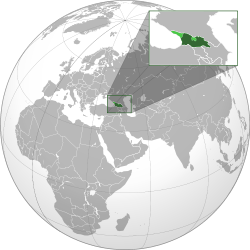Georgians Shaken By Border Incursion Of Islamic Militants
By IWPR
By Teo Bichikashvili
Georgian troops killed 11 suspected Islamic militants who crossed the border from the North Caucasus this week, in what some see as a a worrying sign that instability could spill over from the Russian republic of Dagestan.
Armed men crossed into Georgia on August 28, and seized five people from the village of Lapankuri in the Telavi region.
Two servicemen from Georgia’s interior ministry and a military doctor were killed in the gunbattle that followed when troops were rushed to the area.

The five hostages were released unharmed.
“The bodies of 11 members of the armed group have been found,” Georgian deputy interior minister Shota Khizanishvili, told reporters on August 29, announcing that the bulk of the military operation to root them out was over.
While assuring local residents that they were no longer at risk, Khizanishvili said police units were continuing to operate in the Lopota Gorge in case any injured militants were hiding out there.
This was the first major armed clash Georgia has experienced since its brief war with Russia over South Ossetia in August 2008.
This time, the source of instability lies in Dagestan, where the security situation has been deteriorating as Islamic militants fight Russian security services.
Relations between the Georgian and Russian states remain so poor that even a common security threat like Islamic militants has proved divisive.
President Mikheil Saakashvili accused Moscow of being at the heart of all post-Soviet conflicts in Georgia, including the Abkhaz and South Ossetian wars of the early 1990s. Russia had “exported” turbulence in adjoining parts of the North Caucasus to Georgia, he said.
Saakashvili gave an assurance that his government would not allow “any form of instability or violence to spill over and pose a threat to the peaceful residents of Georgia”, and appealed to his “North Caucasian brothers” not to allow themselves to be exploited.
Some pro-opposition media outlets in Georgia, meanwhile, even suggested that the military operation might have been a ploy by the Saakashvili government to win popular support in the run-up to parliamentary elections to be held on October 1
That argument was undermined by a statement from Islamic radicals in the North Caucasus. A website used by the Caucasus Emirate, originally a Chechen group but now encompassing all Muslim regions of southern Russia, promised vengeance against the Georgian government.
“Our mujahedin brothers did not intend to conduct any operations in Georgian territory; it was not in their plans,” the statement said, claiming that no hostages were taken, either.
“As for the Georgians, they betrayed the mujahedin and killed 11 brave sons of the Caucasus. This is by no means the first time they have taken such a treacherous step in a bid to appease the Putinist regime in Russia.”
The statement warned Georgia to end its “military campaign against the mujahedin” or else it would “acquire another enemy, who will extract savage vengeance”.
The statement scared many Georgians, who look on with horror at the violence engulfing Dagestan.
“Relations with Russia have not improved since the [2008] war, and now the Islamists are threatening us,” Mariam Shaishmelashvili, a 42-year-old resident of the capital Tbilisi, said. Suggesting that the strength of the Georgian military response was dictated by the upcoming election, she said, “surely they could have come to some agreement”.
Soso Tsintsadze, head of Georgia’s diplomatic academy, said the armed forces had no other option than to respond resolutely, since failure to to do so would have exposed Georgia to “even more unpleasant developments”.
Teo Bichikashviliis a freelance journalist in Georgia. This article was published at IWPR’s CRS Issue 656.

Well done Georgian SWAT team; the Georgian territory shouldn’t turn into a safe haven for any outlaws, religious fanatics or criminals from any nationality including Georgians.
If the Mujahedden intend to antagonize Georgia as well good luck but they should better book a turn with those 72 virgins up considering the very high demand nowadays.